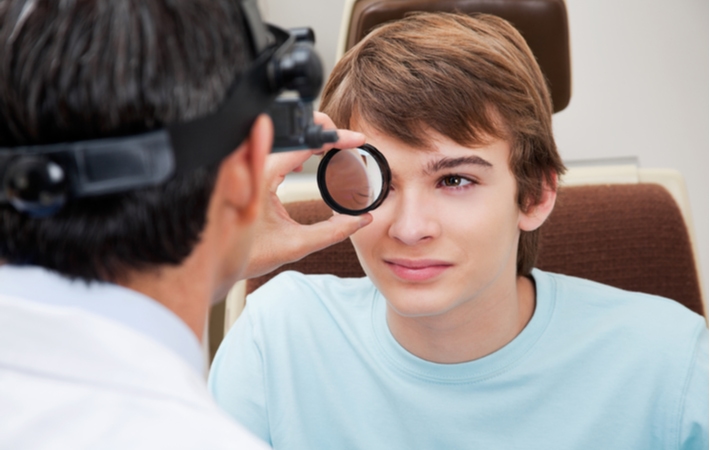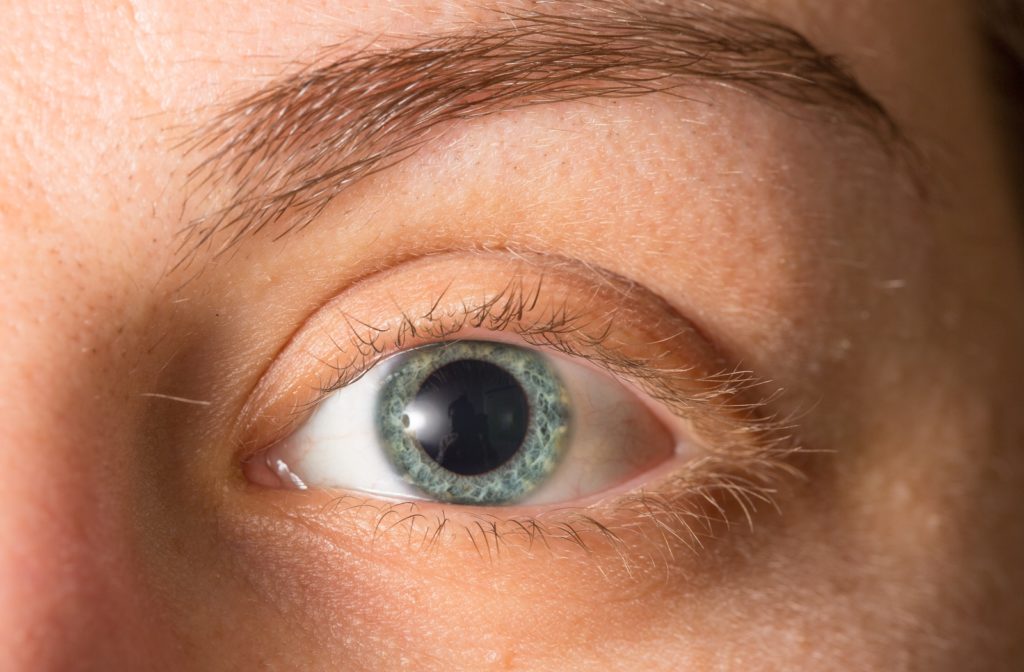Eye dilation is one of the most effective methods to help diagnose eye diseases early. Since the back of the eye is difficult to fully inspect during a comprehensive eye exam, dilated eye exams exist to help your eye doctor screen for potential eye diseases by widening your pupil with dilation eye drops and allowing them to clearly see the back of your eye. If you are concerned about potentially having an eye disease, book an eye exam at Legacy Eyecare — one of our eye doctors can ease you through the process of a dilated eye exam.
What is a Dilated Eye Exam?
Dilation is used during a dilated eye exam to check for eye diseases before they start to cause significant damage to the health of your vision. By dilating your eyes, more light will be enabled to shine into them, which helps your eye doctor check for eye diseases like glaucoma, diabetic retinopathy, and age-related macular degeneration (AMD).
Dilated eye exams are an excellent form of early detection for eye diseases, and can help you avoid long-term damage to your vision. Many eye diseases can start to occur without symptoms or warning signs, so it is important to detect them early on in development to get the best outcomes from potential treatments.
The only difference between a dilated eye exam and a comprehensive eye exam is the dilation of your eyes — a dilated eye exam will still involve your doctor checking for refraction issues like myopia, and performing visual acuity tests before your eyes get dilated to check for eye diseases.
A dilated eye exam will typically include:
- A visual acuity test — Your doctor will perform tests (such as an eye chart test) to discern how clearly you see.
- A visual field test — Your doctor will test your ability to see objects that are off to the sides of your vision without you looking directly at them.
- An eye muscle function test — Your doctor will move an object around your visual field and ask you to follow it with your eyes. This process is performed to check for issues with the muscles located around your eyes.
- A pupil response test — Your doctor will shine a light into your eyes and check how your pupils react.
- A tonometry test — Your doctor will use a special machine to blow a puff of air onto your eye. They may also gently touch your eye with a special tool. This is to check the pressure in your eyes.
- Dilation to check for problems with the inner parts of your eye — Your doctor will dilate your eyes with eye drops to check for eye diseases and problems with the back of your eye.
Are Dilated Eye Exams Always Necessary?
Getting your eyes dilated can affect the next few hours of your day; your vision may become a bit blurry, and your eyes will be more sensitive to light. This means that it may be inconvenient to get your eyes dilated if you have to drive within a few hours of your appointment or have to do activities that are visually demanding.
If you are not checking for eye disease when you visit your optometrist, it is not necessary to get a dilated eye exam. A regular comprehensive eye exam will suffice if you are curious about your current level of visual acuity or are booking an appointment to see if you need an update on your prescription.

When Do I Need to Get a Dilated Eye Exam?
A dilated eye exam is one of the most effective ways to diagnose common eye diseases. Dilation will let your eye doctor get a good view of the back of your eye and will allow them to detect eye diseases earlier than the emergence of outward symptoms would. Some of the eye diseases your doctor will look for are:
- Diabetes
- High blood pressure
- Macular degeneration
- Retinal detachment
- Glaucoma
Some key factors your eye doctor may take into account when considering you for a dilated eye exam are:
- Your age — The risk of developing eye diseases will increase with age. The National Eye Institute recommends a dilated eye exam once every one to two years if you are age 60 or older.
- Your eye health — If you have a history of eye diseases that affect the back of the eye, it may increase your risk of developing eye problems in the future.
- Your overall health — Certain diseases (such as diabetes) can increase your risk of developing eye diseases.
- The reason you are seeking an eye exam — If you have certain detectable symptoms and want to address them, you may require a dilated examination to determine the cause depending on your condition.
When determining how often you should receive a dilated eye exam, you should converse with your doctor about what the right schedule is for your particular situation. You should receive a dilated eye exam every 1 to 2 years if you:
- Are over age 60
- Have a family history of glaucoma
If you have diabetes or high blood pressure, you may need to get dilated eye exams on a more regular basis upon recommendation from your eye doctor. It is typically recommended that people with diabetes or high blood pressure get a dilated eye exam at least once a year.




27 thoughts on “Will My Eyes Need to Be Dilated at My Eye Exam?”
Comments are closed.